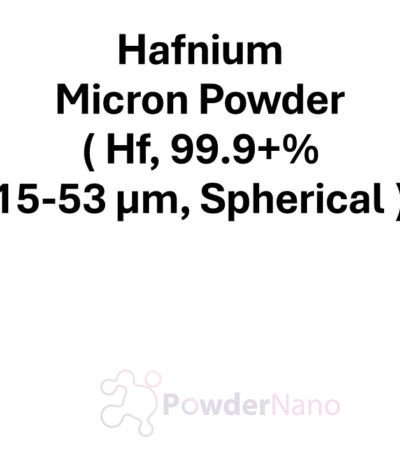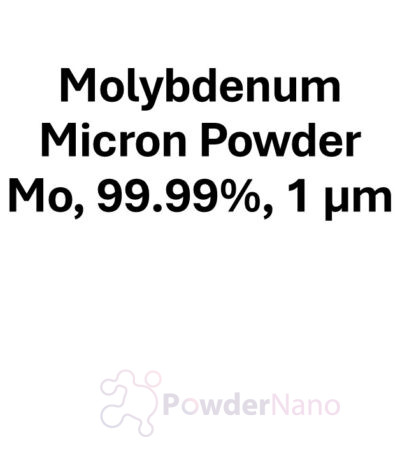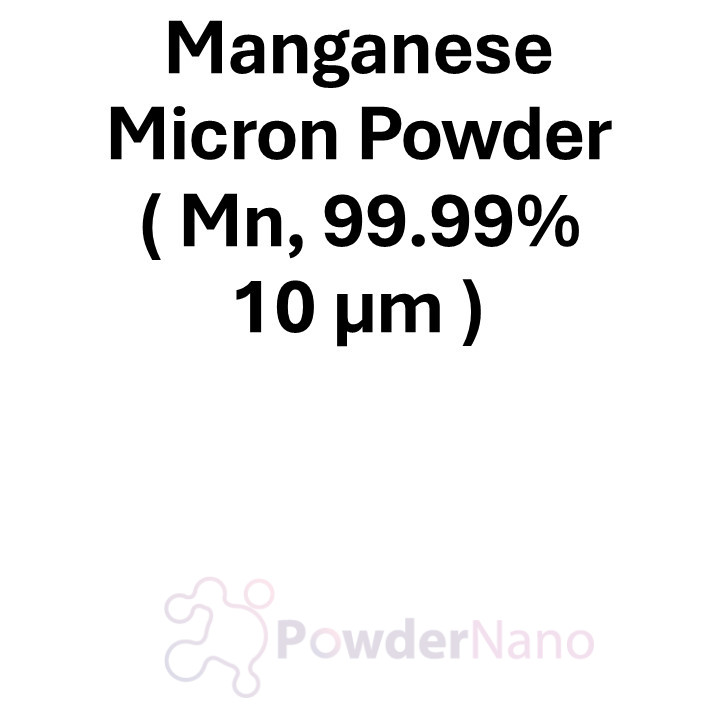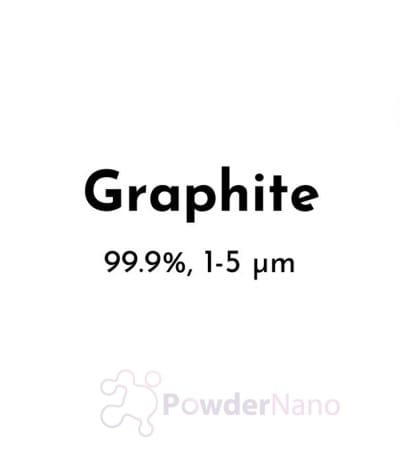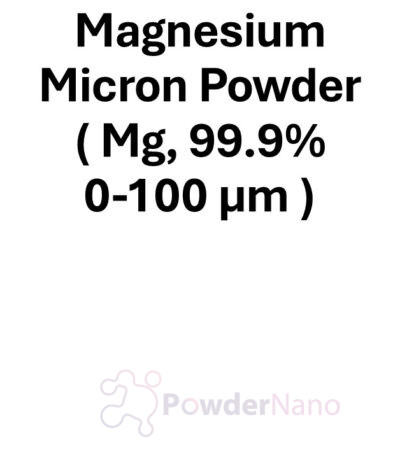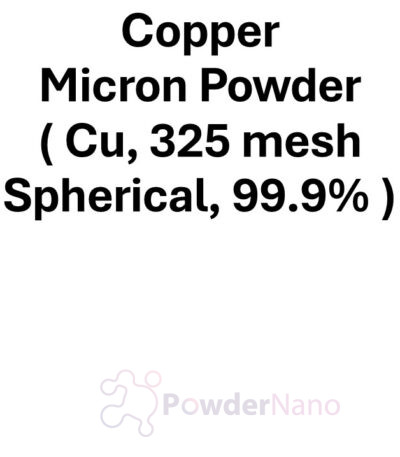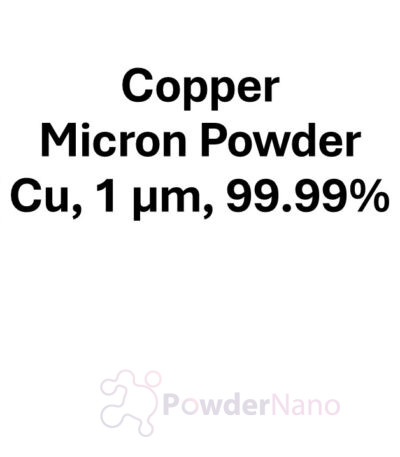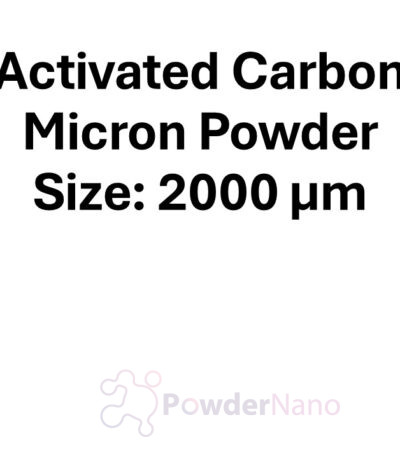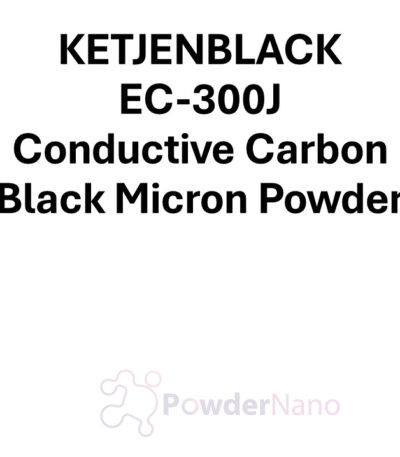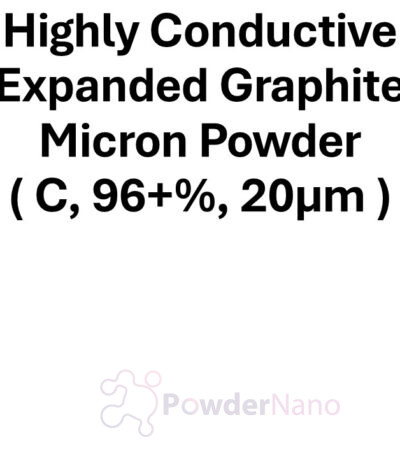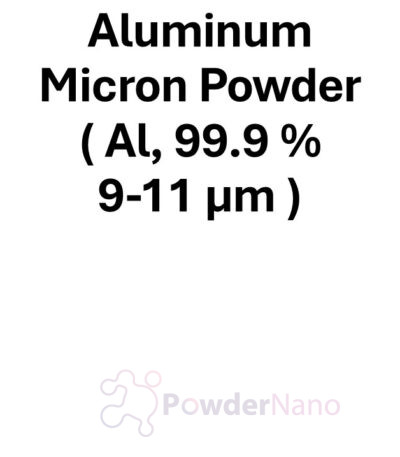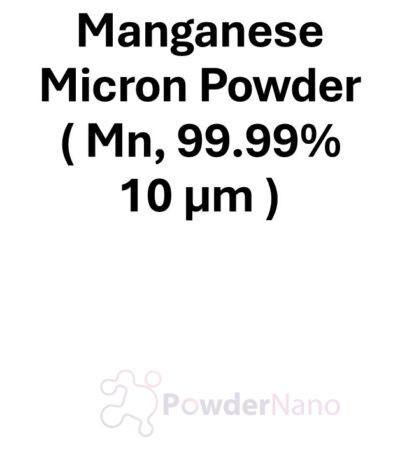Technical Description:
Manganese Micron Powder (Mn, 99.99%, 10 µm) is a high-purity powder composed of manganese (Mn) with a purity of 99.99%. The powder particles are finely sized with an average particle diameter of 10 micrometers (µm), making it suitable for high-precision applications that require a consistent and fine distribution of particles.
- Chemical Composition:
- Manganese (Mn) content: 99.99%, indicating an extremely high purity level with very minimal impurities. This is essential for applications that require precise chemical characteristics.
- Particle Size:
- The powder particles are sized at 10 micrometers, which is an optimal size for processes like powder metallurgy, additive manufacturing, and chemical applications, where fine and uniform particle distribution is critical.
- Shape:
- The particles are typically irregular, as is common with micron powders, though in some cases they may have a slightly spherical shape depending on the method of production.
- Purity:
- With a purity of 99.99%, this manganese powder is highly refined, ensuring that there is negligible contamination from other elements, which is important for demanding and precise applications.
Applications:
- Battery Manufacturing (Lithium-Ion Batteries):
- Manganese is a critical material in the production of cathode materials for lithium-ion batteries, particularly in manganese-based lithium-ion chemistries (e.g., lithium manganese oxide). The fine particle size and high purity of the manganese powder enhance the performance and efficiency of these batteries, which are used in electric vehicles (EVs), portable electronics, and energy storage systems.
- Alloy Production:
- Manganese is a key element in the production of various steel and non-ferrous alloys. The micron-sized manganese powder is used in the creation of high-strength, high-tensile steel alloys. It is also used in producing aluminum-manganese alloys, which are known for their excellent corrosion resistance.
- Powder Metallurgy:
- Manganese micron powder is often used in powder metallurgy processes to manufacture sintered parts. These parts are used in automotive, aerospace, and industrial machinery, where high strength, wear resistance, and fatigue resistance are required.
- Magnetic Materials:
- Manganese plays a key role in the production of magnetic alloys. In particular, the powder is used in the creation of magnetic materials for permanent magnets and for soft magnetic materials used in transformers and inductors. Manganese’s properties enhance the magnetic characteristics when combined with other elements.
- Catalysts:
- Manganese is used in catalysis, particularly in the production of hydrogen, the synthesis of chemicals like formaldehyde, and in petroleum refining. Its high purity ensures minimal contamination, which is crucial in catalytic reactions where the catalyst’s efficiency is paramount.
- Electronics and Semiconductor Industry:
- Manganese is used in the production of components for the electronics industry, such as semiconductors and magnetic storage devices. Manganese in micron powder form is employed in the creation of thin films or coatings for semiconductor devices, where uniformity and high performance are critical.
- Welding Materials:
- Manganese powder is also used in the production of electrodes and fluxes for welding. The high purity ensures a clean weld, and manganese acts as a deoxidizer, which improves the quality of the welded joint by reducing impurities and increasing the strength and hardness of the weld.
- Battery Recycling:
- Manganese micron powder is used in the recycling process of batteries, particularly in the recovery and purification of manganese from spent lithium-ion batteries. Its high purity and fine size make it ideal for efficient recovery and reuse in new battery systems.
- Additive Manufacturing (3D Printing):
- Manganese powder is used in the additive manufacturing sector, especially in metal 3D printing processes like Selective Laser Melting (SLM) and Electron Beam Melting (EBM). The fine powder ensures excellent layer bonding, which is essential for producing high-performance parts used in the aerospace, automotive, and medical industries.
- Steelmaking and Ferroalloy Production:
- Manganese is commonly used in steelmaking as a deoxidizer and to improve the strength, toughness, and hardness of steel. Manganese micron powder is used in the production of ferroalloys that are added to steel to modify its properties. It enhances resistance to wear, abrasion, and corrosion.
- Corrosion-Resistant Coatings:
- Manganese powder can be used to produce coatings that enhance the corrosion resistance of metal surfaces. This is particularly valuable in the automotive, marine, and aerospace industries, where materials must withstand harsh environments.
- Thermal and Electric Conductive Materials:
- Manganese-based alloys are used in applications where materials are required to conduct heat and electricity effectively. These materials are often used in components such as electrical contacts, heating elements, and other components that need to withstand high temperatures and provide efficient electrical conduction.
Summary of Benefits:
- High Purity: The 99.99% purity ensures minimal contamination, making it ideal for specialized applications such as batteries and alloys.
- Fine Particle Size: The 10 µm particle size is optimal for powder metallurgy, sintering, and high-performance manufacturing processes.
- Versatility: Manganese powder can be applied across a range of industries including battery technology, steel production, catalysts, welding, and more.
- Enhanced Performance: In applications such as battery cathodes and alloys, the fine, high-purity powder improves performance, efficiency, and durability.
In conclusion, Manganese Micron Powder (99.99%, 10 µm) is a highly versatile material used in numerous high-tech applications that require precision, strength, and durability. Its properties make it essential in sectors like energy storage, metallurgy, electronics, and more.
